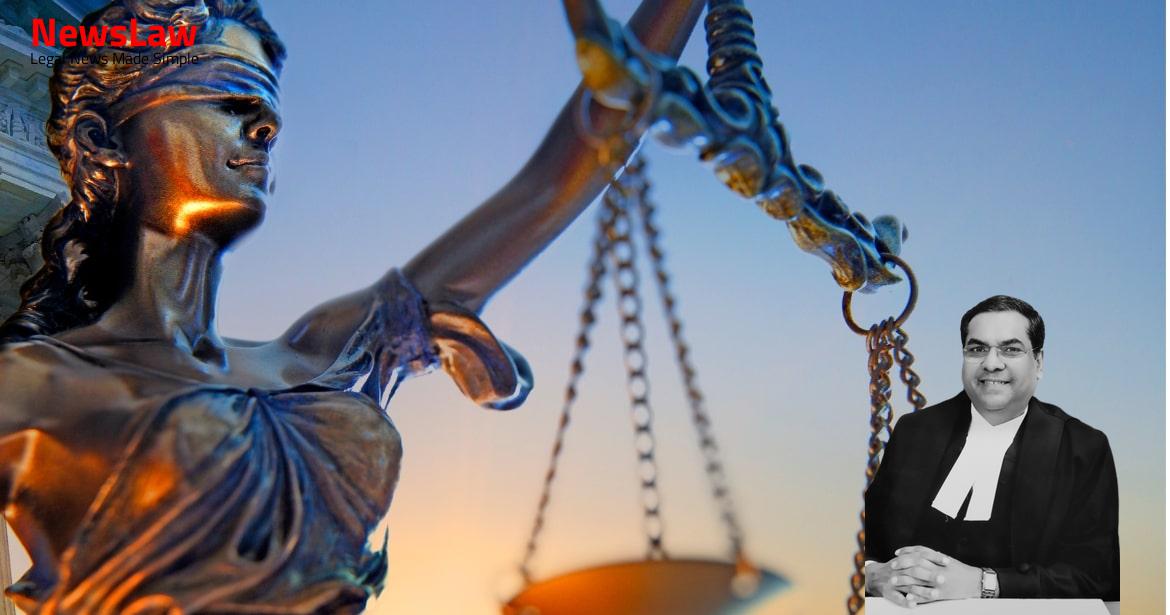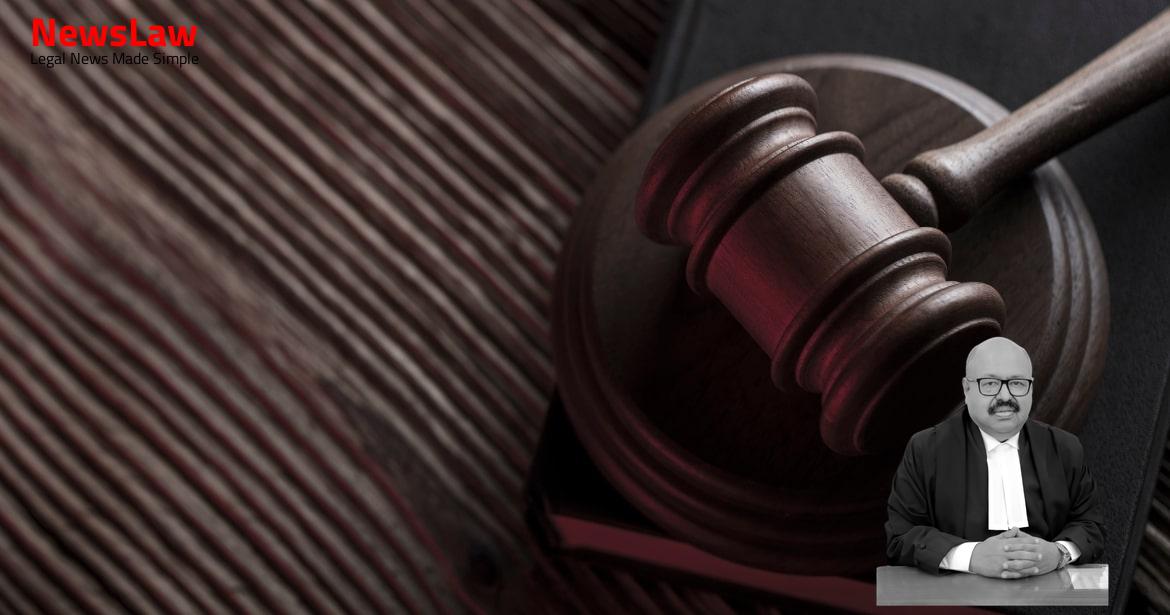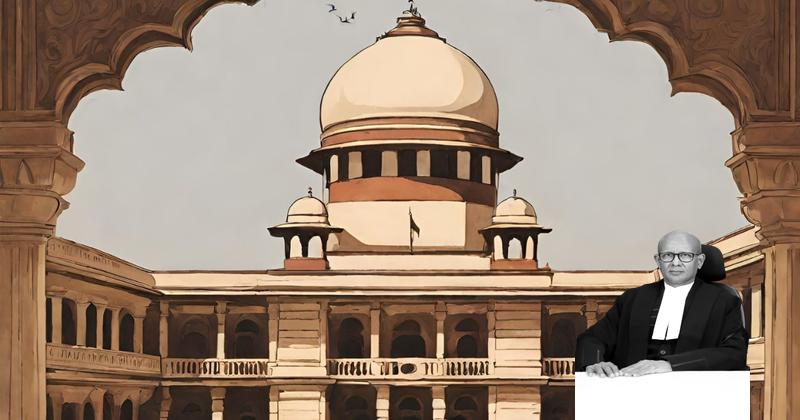Explore the intricate legal analysis by the court regarding the reimbursement of sales tax in government contracts. The court’s thorough examination of the relevant laws and contractual obligations sheds light on the complexities of taxation in works contracts. Discover the implications of contradictory government circulars and the interplay between statutory provisions and contractual stipulations in this case.
Facts
- Circulars dated 07.11.2001 and 19.06.2002 created uncertainty for the contractor regarding reimbursement of sales tax and the possibility of recovery of already reimbursed amounts.
- Contractor filed a writ petition seeking to declare the Circulars illegal and invalid, and to secure reimbursement of sales tax claims.
- High Court granted the prayers of the writ petitioner after examining the contentions of the parties.
- High Court observed delays in service and heard arguments before making its decision.
- Government Circulars and Acts from 1984 onwards have led to changes in the taxation regime for works contracts in Orissa.
- Contractor’s claim for reimbursement of sales tax was based on specific clauses in the General Conditions of Contract.
- Dispute arose when the State Government issued a circular stating that sales tax on completed works was not to be reimbursed, leading to potential recovery of funds already reimbursed.
- The petition for special leave to appeal was found to be barred by limitation by a period of 274 days.
- Sales tax assessments were levied at 8%, and the contractor sought reimbursement of the tax paid for works contracts executed.
- Various Circulars were issued by the Government regarding reimbursement of sales tax, creating confusion and disputes.
- The High Court’s decision favored the writ petitioner in terms of granting the reliefs sought.
- The appeal is against the judgment of the Orissa High Court in W.P. (C) No 8857 of 2003.
- The High Court accepted the claim of respondent No. 1 for reimbursement of sales tax on works contracts.
- Reimbursement was directed in accordance with Clause 45.2 of the General Conditions of Contract.
- The clarification Circular dated 07.11.2001 issued by the Government of Orissa was quashed.
Also Read: Limitation Laws in Insolvency Proceedings
Issue
- The State of Orissa has challenged the order passed by the High Court regarding the nature and implication of sales tax levied on works contracts under the Orissa Sales Tax Act, 1947.
- The challenge also pertains to the operation and import of relevant stipulations in the contracts in question.
- The respondent, a company engaged in works contracts, responded to tenders from various government offices in Orissa and was awarded contracts.
- The contracts included stipulations regarding taxes as per Clause 45 of GCC.
Also Read: Tax Deduction at Source and Section 40(a)(ia) Disallowance
Arguments
- The learned counsel for the appellant argued that the sales tax deducted by the employer at the time of payment does not require reimbursement as the liability is on the contractor.
- Reference made to Constitutional provisions and previous court cases to support the argument of deeming works contract as a sale for sales tax purposes.
- Quashing of the clarification letter and direction to grant reimbursement as per the General Conditions of Contract.
- The appellant’s counsel emphasized that contract price already includes taxes and duties, hence no reimbursement for sales tax is necessary.
- Explanation on the absence of sales tax on the completed item of work in construction contracts and the contractor’s obligation to pay sales tax on the value of goods used.
- Clarification on the correct interpretation of Clause 45.2 of General Conditions of Contract in relation to sales tax reimbursement.
- Contradictory circulars issued regarding reimbursement of sales tax paid by the contractor.
- Disagreement on the interpretation of deductions made in running bills and entitlement to reimbursement based on the contract terms.
- Support from the counsel for the contractor company on the validity of the impugned order and reimbursement claim based on turnover basis deductions.
- The learned senior counsel referenced the Gannon Dunkerley case, Section 5 (2) (AA) of the Act of 1947, Clause 45.2 of GCC, and Circular dated 04.11.1986 to support the claim of reimbursement on deduction of sales tax on a turnover basis.
- The counsel highlighted that deduction of sales tax on turnover basis implies the existence of a sale, hence entitling the contractor company to reimbursement as claimed.
- Reference was also made to various decisions supporting the argument.
- The counsel pointed out that the Circular dated 07.11.2001 contradicted statutory provisions and contractual stipulations, which was rightfully disapproved by the High Court.
Also Read: Interpretation of Purchase Tax on Empty Bottles
Analysis
- The Circulars issued by the State Government were noted to have expressed contradictory views on the reimbursement of sales tax in works contracts.
- The Circular dated 04.11.1986 instructed reimbursement of sales tax in existing contracts with reimbursement clauses, while the Circular dated 07.11.2001 reversed this decision.
- The State Government’s vacillating understanding was deemed not determinative of the contractual obligations between the parties.
- The instructions in the Circular dated 04.11.1986 obligated the State Government to make reimbursements on proof of payment and to not include such clauses in future tenders.
- The Circulars were found to be interpretative of the law and terms of contract at the time of their issuance and were not conclusive in the case being adjudicated.
- The first Circular emphasized the liability for reimbursement in existing contracts with reimbursement clauses, while the second Circular denied such reimbursements.
- The Courts ignored the contradictory Circulars and based their decision on the contractual obligations as per the relevant clauses of the contract.
- The Circulars were referred to at a later stage in the judgement to elucidate the shift in the State Government’s stance on reimbursement of sales tax in works contracts.
- Introduction of the concept of deemed sale in works contracts to overcome the decision in State of Madras v. Gannon Dunkerley & Co. (Madras) Ltd.
- Explanation of the legal fiction introduced by sub-clause (b) of Clause 29-A of Article 366 of the Constitution.
- Determining the value of goods involved in works contracts by deducting various charges related to labor, services, etc.
- Importance of ‘value addition’ post the Forty-sixth Amendment to the Constitution.
- Limitations of State legislative power under Entry 54 of the State List in imposing tax on sales outside the State or in the course of import/export.
- Explanation of the legal fiction introduced by sub-clause (b) of Clause (29-A) of Article 366 as outlined in the Gannon Dunkerley case.
- Observance of the different restrictions imposed by Article 286 on the levy of sales tax by states in the context of Entry 54 of the State List.
- Clause 13.3 of ITB and Clauses 45.1 and 45.2 of GCC specify that all duties, taxes, and levies, including royalties, must be included in the rates and total bid price submitted by the bidder.
- The Constitution (Forty-sixth Amendment) Act, 1982 introduced an inclusive definition of ‘tax on the sale or purchase of goods’, including a tax on the transfer of property in goods involved in the execution of a works contract.
- The constitutional validity of state legislatures’ power to levy sales tax on works contracts was upheld by the Constitution Bench in the Builders’ Association case.
- The passing of property in goods involved in works contracts was explained, stating that the properties transferred to the owner are the goods involved in the contract, not the entire building.
- Doubts at later stage were attempts to avoid contractual obligations
- Circulars dated 27.01.2000 and 07.11.2001 went against reimbursement obligation
- State government was aware of obligation towards reimbursement under existing contracts
- Circular dated 04.11.1986 directed discharge of obligation with safeguards
- State government prohibited inclusion of reimbursement clause in future contracts
Decision
- The appeal has been dismissed with no order as to costs
- The delay in filing has been condoned
- The propositions in the circular dated 07.11.2001 have been disapproved
- Pending interlocutory applications have been disposed of
Case Title: STATE OF ORISSA Vs. M/S B.ENGINEERS AND BUILDERS LTD. (2020 INSC 414)
Case Number: C.A. No.-002516-002516 / 2020



